Zac E. Imel
Leveraging Open Data and Task Augmentation to Automated Behavioral Coding of Psychotherapy Conversations in Low-Resource Scenarios
Oct 25, 2022Abstract:In psychotherapy interactions, the quality of a session is assessed by codifying the communicative behaviors of participants during the conversation through manual observation and annotation. Developing computational approaches for automated behavioral coding can reduce the burden on human coders and facilitate the objective evaluation of the intervention. In the real world, however, implementing such algorithms is associated with data sparsity challenges since privacy concerns lead to limited available in-domain data. In this paper, we leverage a publicly available conversation-based dataset and transfer knowledge to the low-resource behavioral coding task by performing an intermediate language model training via meta-learning. We introduce a task augmentation method to produce a large number of "analogy tasks" - tasks similar to the target one - and demonstrate that the proposed framework predicts target behaviors more accurately than all the other baseline models.
"Am I A Good Therapist?" Automated Evaluation Of Psychotherapy Skills Using Speech And Language Technologies
Feb 22, 2021
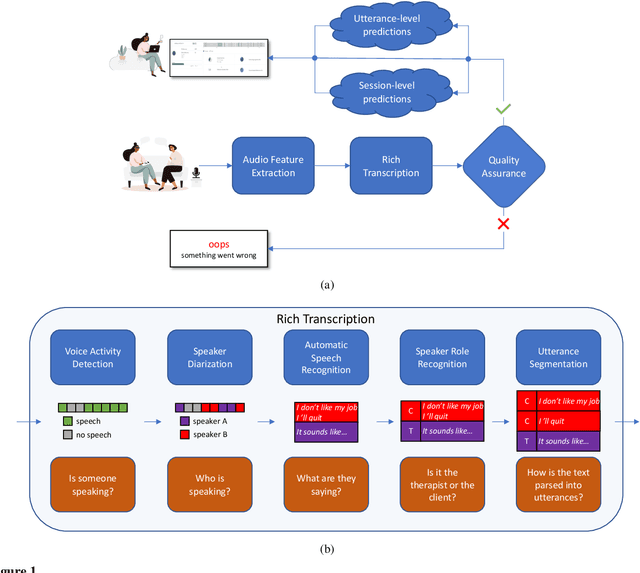
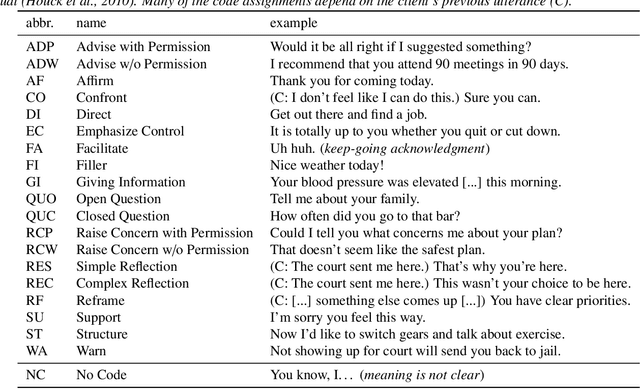
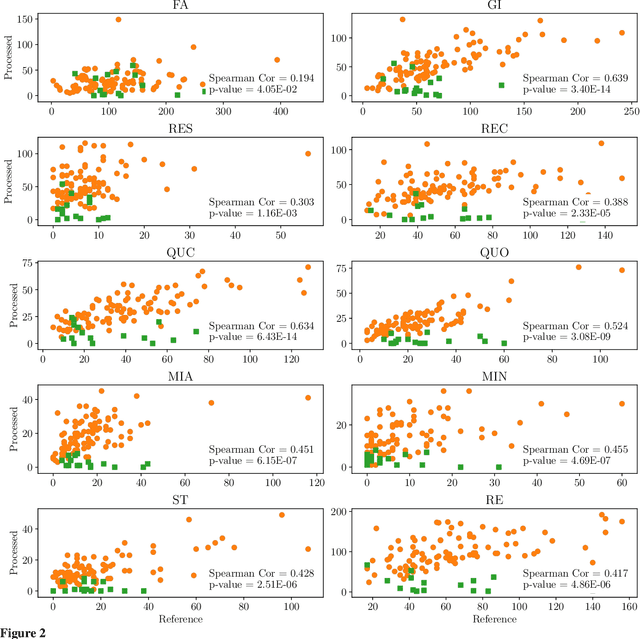
Abstract:With the growing prevalence of psychological interventions, it is vital to have measures which rate the effectiveness of psychological care, in order to assist in training, supervision, and quality assurance of services. Traditionally, quality assessment is addressed by human raters who evaluate recorded sessions along specific dimensions, often codified through constructs relevant to the approach and domain. This is however a cost-prohibitive and time-consuming method which leads to poor feasibility and limited use in real-world settings. To facilitate this process, we have developed an automated competency rating tool able to process the raw recorded audio of a session, analyzing who spoke when, what they said, and how the health professional used language to provide therapy. Focusing on a use case of a specific type of psychotherapy called Motivational Interviewing, our system gives comprehensive feedback to the therapist, including information about the dynamics of the session (e.g., therapist's vs. client's talking time), low-level psychological language descriptors (e.g., type of questions asked), as well as other high-level behavioral constructs (e.g., the extent to which the therapist understands the clients' perspective). We describe our platform and its performance, using a dataset of more than 5,000 recordings drawn from its deployment in a real-world clinical setting used to assist training of new therapists. We are confident that a widespread use of automated psychotherapy rating tools in the near future will augment experts' capabilities by providing an avenue for more effective training and skill improvement and will eventually lead to more positive clinical outcomes.
Feature Fusion Strategies for End-to-End Evaluation of Cognitive Behavior Therapy Sessions
May 15, 2020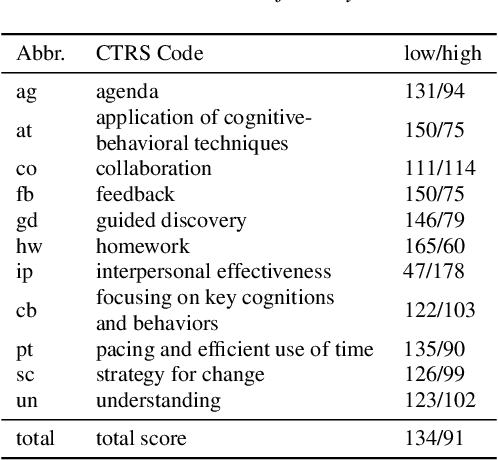
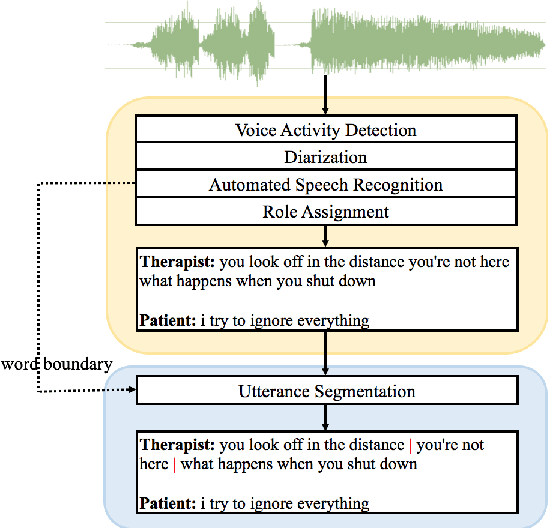
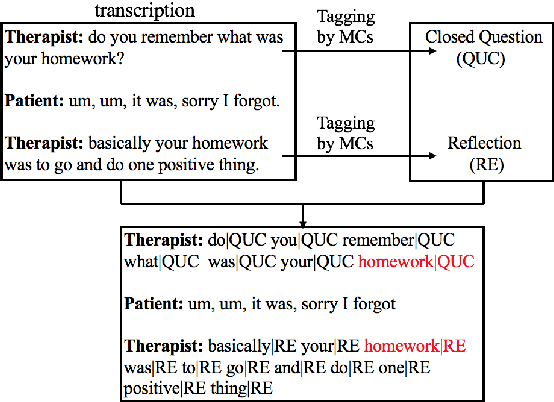
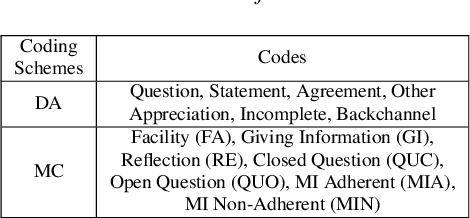
Abstract:Cognitive Behavioral Therapy (CBT) is a goal-oriented psychotherapy for mental health concerns implemented in a conversational setting with broad empirical support for its effectiveness across a range of presenting problems and client populations. The quality of a CBT session is typically assessed by trained human raters who manually assign pre-defined session-level behavioral codes. In this paper, we develop an end-to-end pipeline that converts speech audio to diarized and transcribed text and extracts linguistic features to code the CBT sessions automatically. We investigate both word-level and utterance-level features and propose feature fusion strategies to combine them. The utterance level features include dialog act tags as well as behavioral codes drawn from another well-known talk psychotherapy called Motivational Interviewing (MI). We propose a novel method to augment the word-based features with the utterance level tags for subsequent CBT code estimation. Experiments show that our new fusion strategy outperforms all the studied features, both when used individually and when fused by direct concatenation. We also find that incorporating a sentence segmentation module can further improve the overall system given the preponderance of multi-utterance conversational turns in CBT sessions.
Observing Dialogue in Therapy: Categorizing and Forecasting Behavioral Codes
Jun 30, 2019



Abstract:Automatically analyzing dialogue can help understand and guide behavior in domains such as counseling, where interactions are largely mediated by conversation. In this paper, we study modeling behavioral codes used to asses a psychotherapy treatment style called Motivational Interviewing (MI), which is effective for addressing substance abuse and related problems. Specifically, we address the problem of providing real-time guidance to therapists with a dialogue observer that (1) categorizes therapist and client MI behavioral codes and, (2) forecasts codes for upcoming utterances to help guide the conversation and potentially alert the therapist. For both tasks, we define neural network models that build upon recent successes in dialogue modeling. Our experiments demonstrate that our models can outperform several baselines for both tasks. We also report the results of a careful analysis that reveals the impact of the various network design tradeoffs for modeling therapy dialogue.
 Add to Chrome
Add to Chrome Add to Firefox
Add to Firefox Add to Edge
Add to Edge